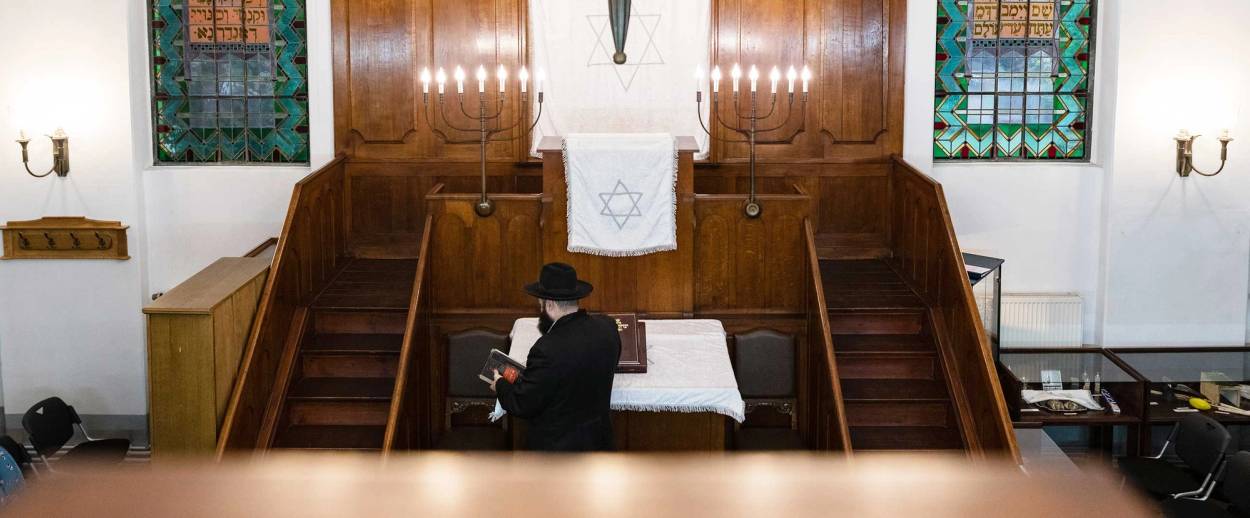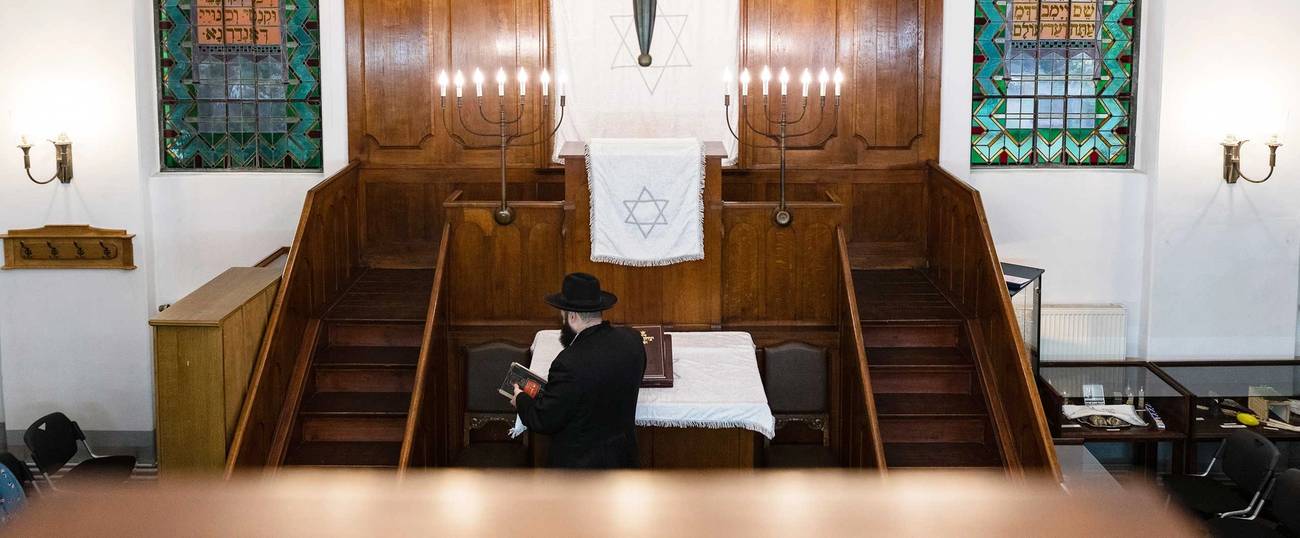The Heroes in Halle
Where Germany’s government has failed to protect German Jews from rising anti-Semitism, they have taken steps to defend themselves—efforts that have saved lives




Roman Yossel Remis had not yet reached the Hineni prayer on Yom Kippur when a white supremacist attacked the synagogue in Halle, Germany, where he was leading services. After police had finally secured a cordon around the synagogue and the sequestered Jews had resumed their prayers, Remis continued with the service, an unmistakable irony nearing the absurd, as he proclaimed the traditional liturgical words “even though I am not worthy or suitable” to be the Jewish community’s representative.
By several accounts, the tall but unassuming Jewish professional who leads a Jewish youth program for the Ronald S. Lauder Foundation (and who I have known for several years through my Jewish community of Kahal Adass Jisroel in Berlin) was the first to react and quickly took charge of the situation. The congregation heard an explosive bang outside the door. Some might have ignored it. But Remis and some other leaders directed their attention to the security camera monitors as a passerby, Jana Lange, was shot dead in the street. Then when they saw a man, heavily armed and in military gear, turn toward the synagogue, Remis went from leading the prayers to leading the crisis response. Yet, despite what is known about Remis’ bravery, much of the response to the Halle attack has ignored or downplayed the calm and deliberate actions he and other Jewish leaders took inside the synagogue. Preoccupied with questions over the rise and root causes of anti-Semitism in Germany and elsewhere, there has been a tendency to under-appreciate the concrete, meaningful actions taken by individual Jews and Jewish institutions to keep the community safe.
German officials, in stark contrast, abrogated their responsibility to the Jewish people. It is they who should be pleading “Hineni—here I stand, impoverished of action, quivering and afraid.” It is the German government which has shown itself unworthy and unqualified. When will they atone? When will they strike their chests and declare their own Viddui confession?
This is the stuff of our worst post-Holocaust nightmares: An armed anti-Semite attacked a synagogue in Germany. But not only did it happen in 2019, it happened twice within a week.
Aside from Halle, an earlier incident occurred on Oct. 4 at Berlin’s New Synagogue. A 23-year-old Syrian man ran to the entrance, brandishing a knife and shouting “Allahu Akbar” and “Fuck Israel.” His attack was thwarted by the police posted to protect the synagogue who subsequently released the perpetrator from custody within a matter of hours.
Since well before the Halle attack, the resounding call of Jewish leaders has been that the time for words against anti-Semitism has passed and that what is needed now in Germany is action.
The Halle synagogue used to have a visible police presence. But a year ago, rather than heed the warnings of Jewish community leaders who were witnessing the resurgence of German anti-Semitism, the authorities in Halle discontinued police protection. Max Privorozki, the head of the Jewish community in Halle, said he had asked in vain for police protection for Jewish holidays and complained about the complete lack of police patrols. Holger Stahlknecht, the state interior minister of Saxony-Anhalt, all but called him a liar and, despite what seemed like obvious failures, defended his police forces.
The German government provided no police protection, funding for security guards, or other means of physical defense for the Halle synagogue. According to the police chronology, the first police officers arrived eight minutes after they received the emergency call, which was four minutes after the terrorist had already left the synagogue.
In Halle the Jews were left to save themselves.
For this they relied on the synagogue’s security system, donated by the Jewish Agency for Israel, with funding from the Helmsley Charitable Trust. Those security cameras made it possible for the Jews inside to make quick informed decisions to shelter in place and barricade the doors. The frustrated terrorist, unable to open the door, wondered aloud, “maybe they will come outside.” Thanks to the security system, there was no chance of that. Jewish Agency Chairman Isaac Herzog was not exaggerating when he said, “That donation saved lives.”
In the wake of the Halle attack, police protection was quickly introduced, reinstated, or enhanced at synagogues across Germany. Whether it will continue long term remains to be seen.
The anti-Semitism threatening Jews in Germany comes from more than a single source and demands a comprehensive governmental response. The two synagogue attacks this month represent the major categories of physical threats to Jews: from the far right and from Arabs and Muslims. But these incidents were only the most disturbing examples of a broader crisis of violence directed at Jews in Germany. Early this month, a man in Bavaria shouted “Jew!” and threw a stone at a Jewish woman, striking her in the head. Over the summer, three Chabad rabbis were spat on, in three different cities.
Far too many accounts have emerged of Jewish children subjected to aggressive anti-Semitism in German schools. Most do not make the news, but one that did was chilling: “Solomon was walking home and stopped into a bakery. When he emerged, he found one of his tormentors pointing what looked like a handgun at him. Solomon’s heart raced. The boy pulled the trigger. Click. The gun turned out to be a fake.”
Germany’s political leaders, meanwhile, make empty declarations at best and play games at worst.
The right-wing AfD party, for instance, is always happy to play up anti-Semitic incidents when the perpetrators are Arab or Muslim. When the anti-Semitism comes from the right, it’s another story entirely. After the Halle attack, AfD state legislator Roland Ulbrich questioned whether the perpetrator is truly a far-right extremist and downplayed the attack on the synagogue as “property damage.”
At the political center, Annegret Kramp-Karrenbauer, Chancellor Angela Merkel’s presumptive heir, referred to the Halle attack as a “warning sign.” Rabbi Pinchas Goldschmidt, head of the Conference of European Rabbis, was one of many to criticize her terminology as out of touch. An armed attack on a synagogue is not a warning sign; it is the horrific outcome of the failure to act on warning signs.
Heiko Maas has said he “entered politics because of Auschwitz.” But it is hard to take seriously his stated commitment against anti-Semitism when, as foreign minister, he has not appeared to have taken any action at all against Iran, a state that promotes Holocaust denial and whose agents were caught scouting German Jewish institutions, including kindergartens, as potential targets.
Chancellor Merkel often describes Germany’s flourishing Jewish community as a “gift.” Yet, the rabbi of Halle, Elisha Portnoy, tells Tablet that Merkel has neither visited Halle nor contacted him in the wake of the attack. (The German president and interior minister did visit.) Perhaps by “gift,” Merkel had meant the unwanted sort that one stuffs in the back of the closet.
Last year, the German government filled the expansive sanctuary of Rykestraße Synagogue to commemorate the 80th anniversary of Reichspogromnacht (Kristallnacht). Merkel declared the obligation of the state to “act resolutely” against anti-Semitism. I wasn’t there to hear her empty words. At that moment, I was listening to little Jewish children playing in the courtyard of the nearby Lauder Nitzan kindergarten, spontaneously singing, over and over, “Hashem melech, Hashem malach, Hashem yimloch l’olam va’ed.” The Lord is King, the Lord was King, the Lord shall be King for ever and all time. In spite of the threats, and no matter the paucity of political support, Germany’s Jewish community has a bedrock of support from within in professionals like Yossel Remis and other young leaders who were in Halle, and from benefactors like the Jewish Agency, who are committed to protecting Jewish lives so they may continue to flourish in Germany.
***
Like this article? Sign up for our Daily Digest to get Tablet magazine’s new content in your inbox each morning.
Andrew Mark Bennett is a lawyer and doctoral fellow in Law at the Freie Universität Berlin. His forthcoming initiative, Hamegilla, aims to reveal the concealed stories that unite the Jewish people.